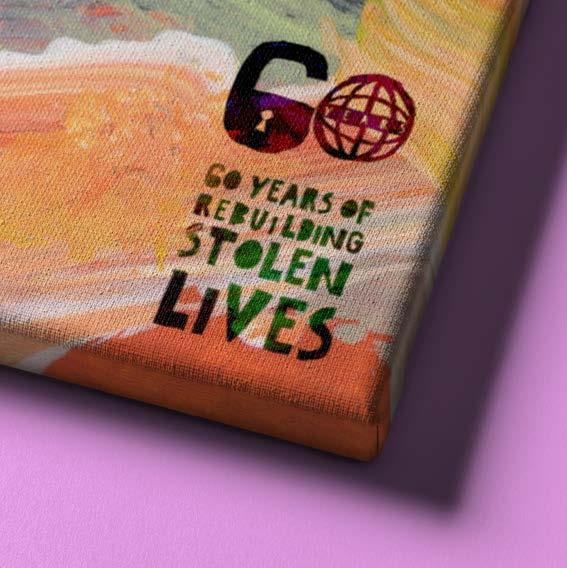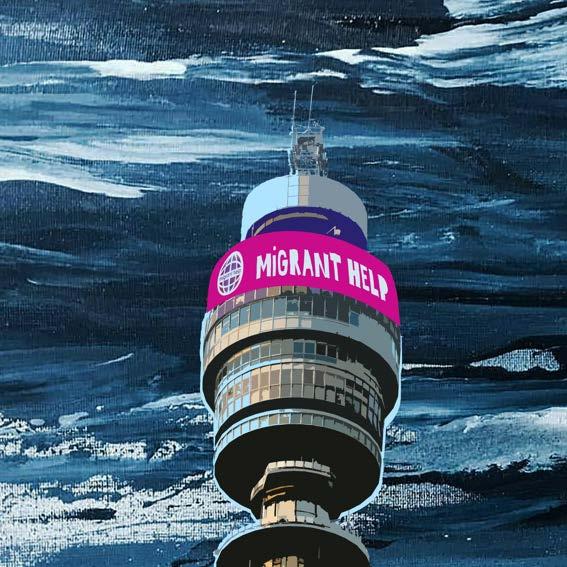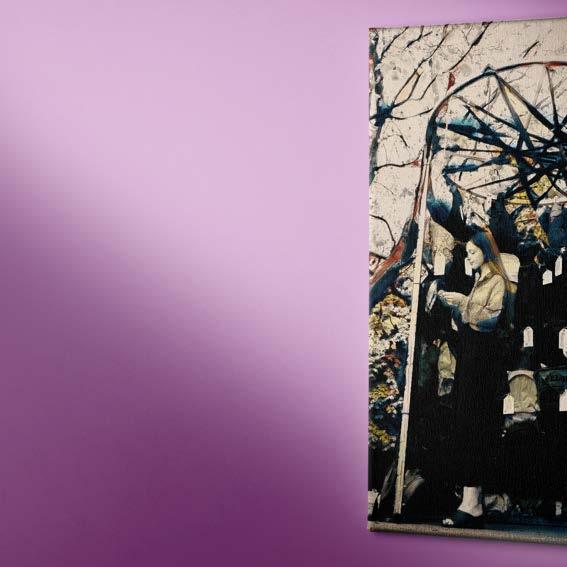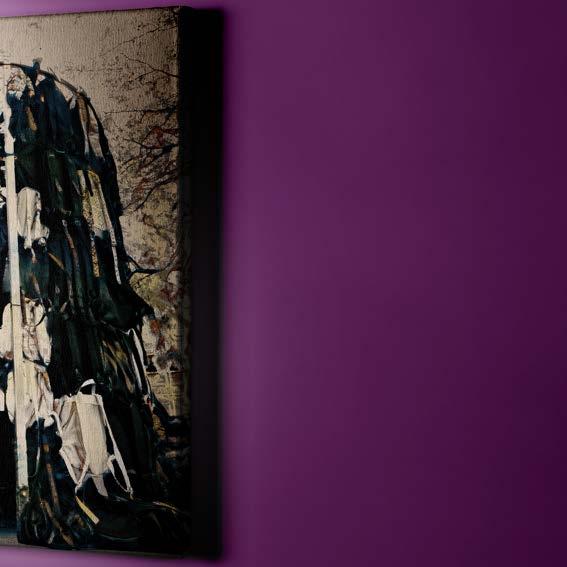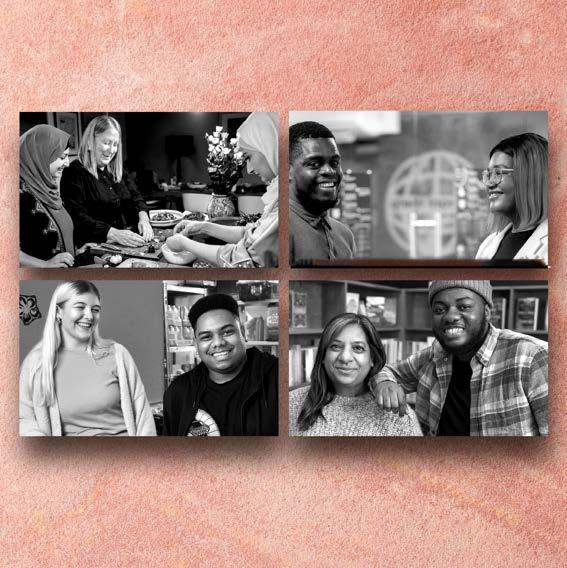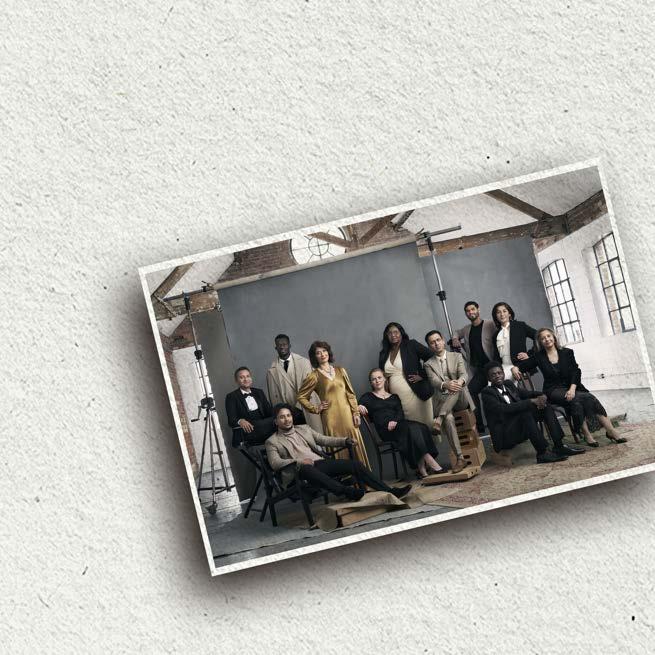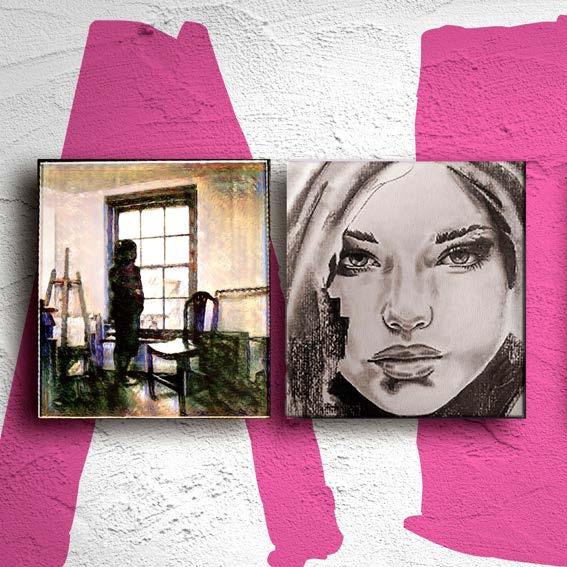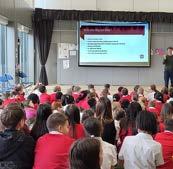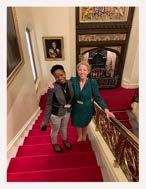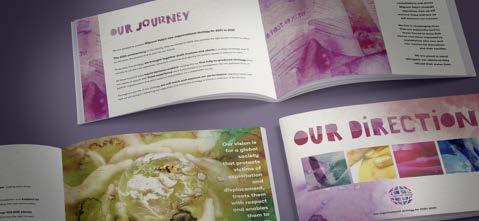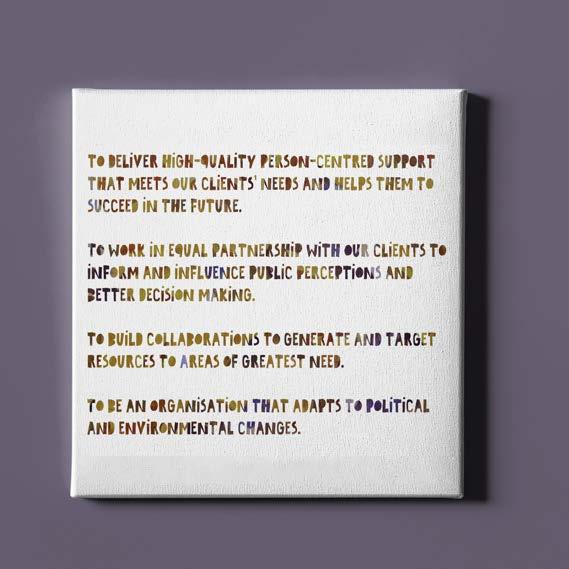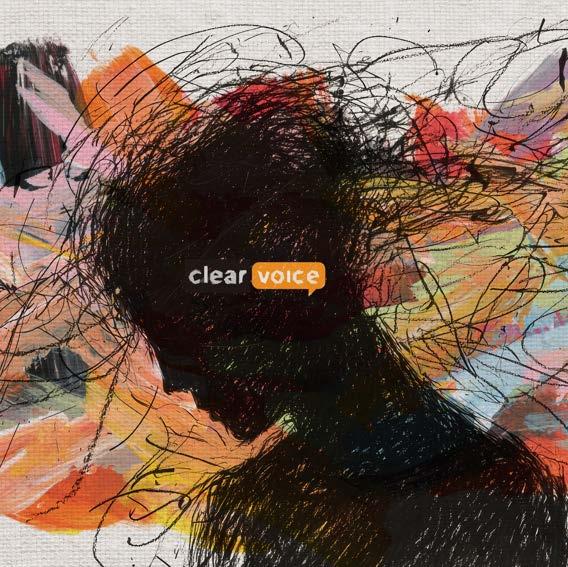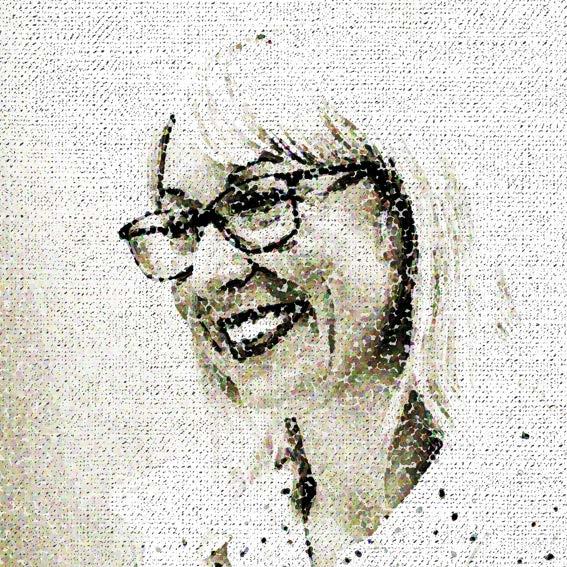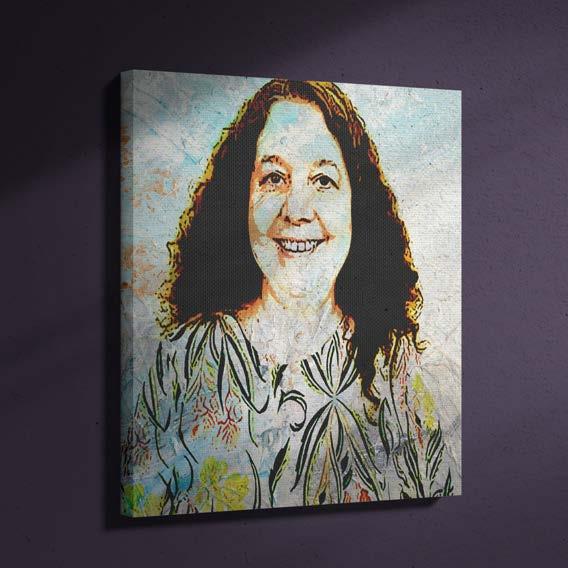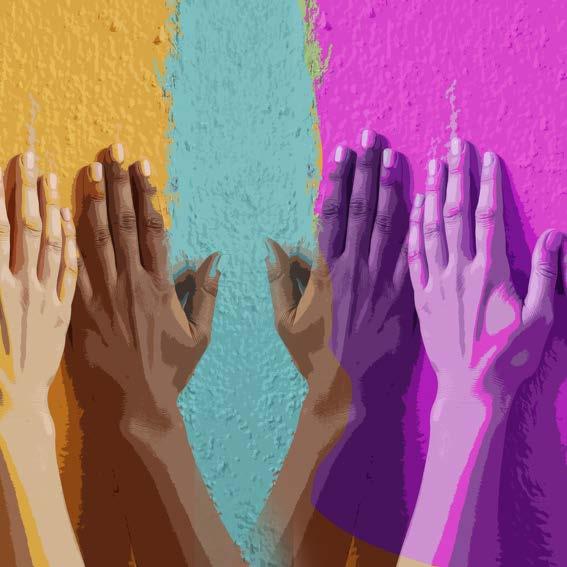


















The art used throughout this report is either created by our clients or employees or produced by artists inspired by the real stories and experiences of our clients and employees.





Every year, millions of people are forced to leave their homes due to conflict, persecution, human rights violations, and the impact of climate change. At the end of 2023, nearly 120 million people worldwide were displaced and 50 million were enslaved.
Refugees, people seeking asylum and survivors of modern slavery often lack access to shelter, food, and psychosocial support.
Migrant Help exists to protect people affected by displacement and exploitation, helping them thrive as individuals and re cover from their trauma.
We support those most in need and least likely to find support elsewhere, whilst aiming to bridge community gaps and bring services and support together.
We stand for equality, diversity, inclusiveness and empathy, and work in partnership with clients and other organisations to deliver the highest standard of care.

















This year has been especially challenging for people seeking asylum and survivors of slavery, as well as for charities like ours, striving to provide vital services amidst a turbulent landscape of political uncertainty and substantial financial pressures on public service delivery.
Asylum application numbers rose with about 93,000 people claiming asylum due to various global humanitarian crises during the year. The asylum caseload also continued to increase, with about 70,000 people waiting for decision on their claims for more than three years. All this has severely impacted UK’s asylum processing system as it grappled with the complexities of managing migration within the backdrop of global conflicts and economic instability.
People seeking asylum the UK need to navigate a complex legal framework, which includes the right to apply for asylum upon arrival, the provision of support through housing and subsistence payments, legal representation, and follow-on support for resettlement and employment. The processing of asylum claims has suffered from persistent backlogs, leading to prolonged waits for
applicants, further stressing woefully stretched public services, particularly housing and health.
We witnessed rising intolerance driven by tensions surrounding migration issues, deep-seated community anxieties, the perceived strain on local resources, public services, and threats to social cohesion. All of this had a profound effect on charities supporting people seeking asylum, as not only did our clients face heightened anxiety and fear, but our staff too had to ensure they remain supportive, empathetic and professional in spite of external turbulences.
The UK’s handling of asylum and migration reflects a need for both immediate solutions and long-term strategies to balance humanitarian responsibilities with national security considerations.
Within this context, during 2023-24, we helped more than 55,000 people with their asylum support applications, supported 3,200 survivors of modern slavery and trafficking, and assisted over 70 families to resettle in the UK. Our free asylum helpline answered over 806,000 calls in more than 200 languages, an increase of nearly eight percent since the previous year.
Our award-winning social enterprise, Clear Voice provided over 16.3 million minutes of interpreting and supported 96 refugees through professional training in Levels 1 to 3 Community Interpreting qualifications.
At Migrant Help , we are determined to support every one of our clients through their journey from fear and persecution to hope and transformation.
Our strategic initiatives include building communities of support through partnerships within the sector – such as Community Hubs, the Youth Welfare project, and Specialist Advisers. Our Lived Experience Advisory Panels (LEAPs) are now deeply embedded across all our operations, and an integral part of the governing Board.
Migrant Help staff have remained unwaveringly committed to their mission, working diligently to adapt to the volatile environment and to continue providing essential services to our clients.
They are supported by an exceptional leadership team, led by the CEO Caroline O’Connor, who has brought transformational insight, vision and compassionate resilience that is evident throughout the organisation. Indeed, this has been
nationally recognised as Caroline was awarded the Charity Chief Executive of the Year at the 2024 Third Sector Awards.
This report is a testament to our commitment and the incredible work we have accomplished together over the past year.
As we navigate an increasingly uncertain and polarised world, the need for kindness, support, and advocacy for displaced people has never been more urgent.
It encapsulates the stories of resilience, hope, and transformation that arise from the dedication of our team and the invaluable contributions from our partners. It highlights our initiatives, the challenges we’ve faced, and the tangible impact we’ve made in the lives of those who turn to us for help.
On behalf of the Board of Trustees, I express my profound gratitude to our staff for all that they do and promise every single one of our clients that we will stand tall together with them to build a more compassionate society.

Madhavi Vadera Chair of the Board of Trustees
Our core services are aimed at supporting people affected by displacement and exploitation in the UK.
These include:
• Asylum services
• Support for survivors of modern slavery and human trafficking
• Refugee Resettlement
• EU Settlement Scheme
• Clear Voice - interpreting and translation services


Extreme violence, such as armed conflict or persecution for one’s beliefs, gender, sexual orientation, identity, or political views, frequently forces people to flee their homes.
For over 60 years, Migrant Help has welcomed displaced people as they arrive in the UK, helping them rebuild their lives. We provide assistance in accessing housing, financial support and navigating the asylum system.
We are proud to stand by our clients at every step of this challenging journey.
This year we supported increased numbers of people in many areas of our work.
We have helped complete 56% more applications for support compared to the previous year and saw an increase of over 150% in people needing help with ‘move-on’ support.
The top five countries of origin of Migrant Help clients were

“The agent I spoke to showed so much humility. Thank you so much for all your help.”


“Migrant Help guided me very well and got my problem resolved every time.”
Our asylum services have grown and developed significantly.
Over the past 12 months, we have recruited dedicated staff to lead on innovations, opened a regional office in the West Midlands to provide face-to-face support, and commissioned nearly 2000 pieces of work to partner organisations.
We would like to thank the partners who work with us to provide support to people seeking asylum across the UK.
This year we provided nearly 384,000 individual pieces of advice and guidance.
We are continuously trying to improve the accessibility of our services. As part of this journey, we introduced the ‘Recite Me’ assistive toolbar on our website that can be used to translate text into over 100 languages, for text to speech conversion, styling and customisation, and reading aid.
Since August 2023, we have expanded our webchat services, so that our clients are able to contact specialised advisers for assistance with queries that were previously limited to the helpline.
Migrant Help’s Community Liaison Coordinator brought a group of clients together in Derby to form a football team.
Aged between 18-30, and originally from countries including Afghanistan, Iraq, and Sudan, the team was diverse in their backgrounds and experiences but united through sport.
The coordinator gave an interview to raise awareness of our work, which was published in The Independent, Evening Standard and Indy 100, as well as many local outlets.
“I think we can all get along – just leave your prejudices behind because there’s a lot of negative information flying about but me et the pe ople and speak to them and you’ll be surprised to see what kind of people they are.”




Our Lived Experience Advisory Panel (LEAP) for asylum services created a co-produced survey to monitor Migrant Help’s quality of customer service. Translated into the top five languages spoken by our clients - English, Arabic, Albanian, Farsi, and Kurdish Sorani - the sur vey allowed teams to receive targeted feedback from our diverse client base.
Led by our Outreach team, the pilot phase from October 2023 to December 2023 offered valuable insights into our services’ effectiveness and collected helpful feedback.
We expanded its reach to regional teams from February 2024 and feel confident that the co-produced survey will continue to empower our teams, driving us towards even greater excellence in customer service.
Our Outreach team offers specialist support to the most vulnerable clients.
Over the last year, we have continued to provide advice and guidance to survivors of trafficking, torture, domestic violence, and those with additional needs.
Working closely with the Safeguarding team to make sure the support we provide is suitable; we conducted more than 5500 outreach appointments this year.
The Outreach team has expanded over the last year, supporting more people face to face than ever before. Advisers have focused on reaching clients in remote hotels, ensuring that those in isolated areas are able to access Migrant Help’s support.
The service also established a referral pathway for deaf clients and is now able to support clients over email, webchat and video calls.

Funding from our Neil Wildman Children’s Fund was imperative in supporting some of our most vulnerable clients, including Maya, a young mother fleeing domestic violence.
Maya was struggling to keep her children occupied in their hotel room, but toys, books and tablets provided through the fund brought fun, curiosity and joy back into their lives.




The team helped people like Arun, who was disputing his age and struggled with deteriorating mental health. Arun left his initial accommodation due to fear and discomfort with sharing a room with a much older man. Our outreach adviser helped Arun back into accommodation, ensuring he was in his own room, and clarified the steps involved in the age dispute process.
The adviser also helped Arun reach out to a GP regarding his mental health and signposted him to additional support services in the community.
And Amira who, after experiencing physical and sexual abuse by her stepfather in Iran, had depression and was struggling to sleep.
Our outreach adviser contacted Amira to ensure she was safe and no longer at risk from her stepfather. The adviser completed a domestic violence assessment and connected Amira with community support services.

“My adviser was polite, showed empathy and addressed situation professionally keeping in mind that a resolution is key. Thank you for your support and understanding, I was hopeful after talking to the adviser, I am grateful.”


Our Safeguarding service has grown significantly over the past year. We have introduced new roles, including a Disability Adviser and a team of National Referral Mechanism (NRM) advisers.
We received excellent feedback in an external safeguarding audit by the Ann Craft Trust in January 2024, which concluded that Migrant Help has ‘an effective open safeguarding culture supported by strong leadership and governance’.
The Safeguarding team has provided training to operational teams across the organisation, covering topics including disability awareness, domestic violence and age disputes.
We established Safeguarding Champions to promote more awareness of safeguarding across all teams and represent colleagues’ views at meetings. Safeguarding Champions meet monthly and work on different safeguarding topics across the year.
They also participated in Safeguarding Adults Week, distributing daily internal blogs on topics including compassion fatigue and trauma informed practice. Safeguarding bulletins have been developed and are shared across the organisation bi-monthly.
The bulletins highlight policy and guidance changes, in addition to addressing frequently asked questions and sharing case studies.
The Age Dispute Adviser supports clients who are applying for asylum support and state that they are under 18 years old. The adviser makes the necessary enquiries with the Home Office, referring to social services where appropriate and providing clients with information on their rights and entitlements when disputing their age.

"I feel more secure that my real date of birth will be given".
Our Disability Adviser receives referrals to support clients with physical and mental disabilities, further to creating a database of organisations that can offer additional support. Our adviser has also created guides on how to support clients with different disabilities, which have been shared across the organisation.



Kaya was referred to our Disability Adviser for support with dementia and other long-term health issues.
Kaya’s support worker had concerns about her capacity to attend her asylum interview alone, as well as her difficulties with booking medical appointments.
The Disability Adviser learned that Kaya had been given train tickets to attend her asylum interview but often becomes confused and lost when travelling long distances.
The adviser liaised with Kaya’s solicitor to submit a request to the Home Office that the interview be re-arranged and done in an accessible way.
Kaya also consented to a social services referral, to access further support with everyday tasks like remembering appointments and travelling to new places.




The National Referral Mechanism (NRM) team provides guidance and assistance to other Migrant Help
staff around the NRM and is a primary contact and liaison for external organisations seeking advice or First Responder assistance.
The advisers support potential victims of modern slavery with referrals into the NRM, alongside monitoring reasonable grounds decisions and dealing with reconsideration requests.

Jassar contacted Migrant Help about his previous employer withholding wages and the poor treatment he experienced while at work.
Jassar was homeless and relying on friends to meet his basic needs.
Our adviser told Jassar about the process for referring and supporting potential victims of modern slavery, and Jassar gave a statement the same day to start his referral.
Our adviser explained that we could request emergency accommodation support through The Salvation Army.
Jassar was granted a positive decision 12 days later.
“I feel pleased that you made a call to check on me, I am grateful that you called today.”


There are more people enslaved in the world today than at any other point in history, with estimated figures reaching upward of 50 million people. There are more than 100,000 people living in slavery in the UK.
Examples of modern slavery include sexual exploitation, forced labour, domestic servitude, forced criminal activity or removal of organs.
Modern slavery does not have a typical victim, but it disproportionately affects vulnerable people and marginalised groups. In the UK, children account for nearly 44% of all identified victims.
Migrant Help provides specialist support and accommodation to survivors of modern slavery and their dependants. This year, we have supported 3,213 survivors across England, Scotland and Northern Ireland.
Those we assisted most often experienced forced labour, criminal or sexual exploitation. Across the UK, our dedicated casework teams develop support plans and facilitate access to key services to empower clients as they recover from the trauma they experienced. Our aim is to reduce the risk of re-trafficking and help survivors rebuild their lives.




In October 2023, representatives from Migrant Help attended the Conference of Parties to the United Nations Convention Against Transnational Organised Crime in Vienna. This annual conference reviews how member states of the United Nations are implementing this convention and highlights the role of civil society in combatting human trafficking.

Migrant Help’s Policy and Public Affairs Manager, shared: Through the Constructive Dialogues, we had an opportunity to meet charities from across the globe who also campaign for and deliver support services for survivors of trafficking. Over the course of two days, we heard from these organisations about some of the challenges they face in the course of their work but also about inspiring and creative solutions they have developed to overcome them.

Emphasis was placed on creating an atmosphere to share best practice, using our respective experiences to offer new ways of thinking to tackle challenges. We observed and listened, but with the collective experience of our organisation and all the work our staff do day in and day out, we also felt we had knowledge to contribute to the discussion.

In England, Migrant Help is subcontracted by The Salvation Army and has teams in London, Dover, Oxford, Luton and the West Midlands. This year, they supported 1722 clients and nearly 400 dependants from 89 countries.
Our person-centred approach and tailored support plan helped clients grow in confidence and independence.
Our English classes in Kent have been well attended, as have parenting workshops and counselling services. These initiatives have been instrumental in achieving sustained support and community integration for survivors.
We fostered collaboration and learned from others in the sector at the Modern Slavery and Human Trafficking conference in September, raised awareness of our work in the Southend Against Modern Slavery partnership, and joined existing anti-slavery partnerships in Essex, Suffolk and Norfolk.
We also created many new partnerships with housing associations and homelessness charities to better support and improve outcomes for clients at the intersection of destitution and modern slavery.
Modern slavery teams across England came together to celebrate Migrant Help’s 60th anniversary, volunteering, baking and even holding an art exhibition to raise money for our Hardship Fund.






“It’s
been an absolute pleasure to be a part of safehouse under kind and supportive supervision of Migrant Help’s amazing team. When I entered your community, I was confused and helpless, but the support from you has made me the happiest and proudest version of myself.
So far, I have achieved many good new things with your support.”



Victor was subject to financial abuse and coercive control by his partner in Namibia, who forced him to work without pay for his family business. Victor also experienced physical violence by his uncle, who sought to punish him for his sexuality.
Victor escaped his partner whilst on a trip to England and located a cousin who supported him in the immediate aftermath of the abuse. When Victor entered our service, he was experiencing nightmares, and expressed that he felt lonely, useless, and couldn’t picture his future.
Migrant Help helped Victor to register with a GP, access medical appointments and free prescriptions, and his mental health improved significantly. Once Victor was granted his refugee status, he began working at a local care home for elderly residents where he thrived and was nominated for support worker of the month.
Victor joined a gym and bought a bicycle which he has used to explore his new local area.
Victor has expressed his gratitude for the support he received from Migrant Help and said that he was keen to give back and do what he could to help others. Victor recently became a volunteer at a local church, serving food to people experiencing homelessness.



Over the past year, our service has expanded, notably with the opening of a larger Glasgow office in July 2023 and the addition of new team members. In total, we supported 867 clients and 37 dependants, the majority of whom (81%) were aged 18-35.
We delivered meaningful client-centred activities, including organising a carnival outing and a communal meal to celebrate cultural diversity, with adjustments for those observing Ramadan.
Weekly art therapy sessions enabled clients to explore and express their emotions creatively, culminating in a communal art showcase.
In October 2023, teams from across Migrant Help united to deliver workshops across Scotland, equipping frontline professionals to better connect vulnerable people with our support.
We fostered impactful partnerships with Renfrewshire Social Work for streamlined support for clients with age disputes, the Helen Bamber Foundation for trauma-informed training, and the Victim Surcharge Fund to provide laptops to clients.



Cory was referred to Migrant Help by the British Red Cross.
Due to a traumatic brain injury from an attack during his exploitation, Cory struggled with both short and long-term memory, which made it challenging for him to remember appointments, find his way around, or even access his secure accommodation.
With our adviser’s support, Cory gradually developed a routine and improved his memory for daily tasks. The extent of his vulnerability meant Cory could stay in our services for ongoing support.
Over time, Cory began engaging with community mental health services, learned local public transport routes, and joined various social activities, such as nature walks and museum trips.
He then began attending English classes, where he became a committed student, eventually progressing to a further education college.
Recently, after several years of Migrant Help support, Cory moved into a new asylum accommodation. He continues to attend college, manages his hospital appointments, and visits the Glasgow office weekly for foodbank deliveries.
Cory’s case is a remarkable success story of a transformation from a vulnerable person into a confident member of society.
Our highlight this year was undoubtedly a successful bid with the Department of Justice in Northern Ireland, which will allow us to continue our work supporting adult male survivors of modern slavery and human trafficking.
We partnered with the International Organisation for Migration (IOM) to launch the "Star Programme" in February 2024. This 12-week program, which includes both classes and one-on-one mentoring, helps clients integrate into the community by teaching the history and culture of the region, digital literacy, and employment skills.
In the first year, more than 30 clients are expected to benefit from the program, which has already seen strong engagement and success.
We’ve also increased our collaborative work with a longstanding partner, Flourish NI, who have supported many of our clients after they leave our service.
This year, a former client has been employed by Flourish to support male survivors with complex needs.


When Mo entered Migrant Help’s modern slavery service, he was experiencing nightmares and poor
mental health. Mo told his adviser that he was feeling isolated in Derry and had more connections in Belfast. With our help, he was relocated within two weeks and his wellbeing began to improve.
Despite enduring extensive trauma, Mo was determined to rebuild his life.
Our adviser discovered that Mo was fluent in five languages and encouraged him to enrol in an interpreting course with Diversity NI, with financial and technical assistance from Migrant Help.
Mo completed the course successfully, leading to job offers from both Diversity NI and Clear Voice.
Earlier this year, Mo was able to visit his family in Uganda after years apart.
He has since returned to Belfast for work, with family reunification as his next go al.
His story highlights the profound impact that dedicated support can have on a client’s journey.
Migrant Help supports individuals and families who come to the UK under an official resettlement scheme.
This service helps people settle into their new communities in Kent, assisting with access to services such as education, healthcare, and employment support.
Over the past year, we supported 365 people in their integration.
We are proud to have been able to ensure immediate access to healthcare services, enrol over 150 children in school, and support 100 adults with job placements and skill-building workshops. Community events fostered social connections and cultural exchange, and partnerships with NHS Trusts, schools, and NGOs amplified support, enabling immediate and comprehensive assistance to new arrivals, helping them rebuild their lives with dignity and hope.


When brothers Ahmad and Zakareya arrived in the UK with limited English, they struggled with the language barrier and a lack of formal qualifications.
The Resettlement team worked tirelessly to secure Ahmad a place in 6th form, and Zakareya a place to prepare for his GCSEs while taking additional ESOL classes.
Through the collaborative efforts of the Resettlement team and the perseverance of the two brothers, Ahmad, now 22, is attending Plymouth University studying biomedical science, while Zakareya, 20, is pursuing civil engineering at Portsmouth University.
‘Over the last five years, my family has been the fortunate recipient of unwavering support and kindness from Migrant Help and the people who worked there whose generosity has touched our lives deeply.
From the bottom of our hearts, we extend our sincerest thanks and appreciation to each one of you. Your selfless acts of kindness, whether in the form of time, resources, or emotional support, have been a beacon of hope and strength for us that made us move forward.
In moments of difficulty and uncertainty, your assistance not only provided us with practical help but also reminded us of the beauty of human compassion and community spirit.
We are eternally grateful for your benevolence and the positive impact you have made in our lives.
Thank you for standing by us, for your unwavering support, and for showing us the true meaning of community and kindness. Ahmad


This service helps vulnerable EU citizens, and their families, apply for the EU Settlement Scheme (EUSS) in England.
This year we advised nearly 14,500 people and referred over 1000 complex cases to organisations for further support.
We were delighted to secure a new contract in July 2023.
Previously, more than eighty organisations provided EUSS support across the UK, but the Home Office streamlined this to one organisation in each devolved nation, recognising the exceptional work our team has delivered over five years.
As a result, we have expanded our team from only two members to 11, and have over 30 face-to-face clinics across England, provided in partnership with local organisations.


“One of our vendors, who has learning difficulties, has applied for settled status many times over several years and has always had her application rejected. She has lived in the UK for many years but has very little to evidence it. This has caused her a great deal of anxiety.
However, through your adviser’s advice and guidance, she has now successfully been granted settled status.
Your EUSS adviser has always gone out of her way to work in partnership with us, setting up drop-ins at our office. I have had colleagues from as far as Newcastle getting in contact with me to express their gratitude for the help our vendors have received from Migrant Help to apply for their settled status. “ Outreach worker at The Big Issue


Filip was 17 when he entered our service as a Joined Family Member (JFM).

His mother, who had terminal cancer, had applied for settled status, but her application was delayed due to deportation procee dings, impacting
Filip’s application. The family were unable to access public funds or services.
After Filip’s mother died late 2023, we advocated for Filip’s status to be granted urgently. We provided emotional and practical support, helping him navigate essential tasks like registering his mother's death.
Filip was granted settled status and is now working to rebuild his life in the UK, as his mother had hoped.



Our Youth Welfare project supports people aged 18-25 throughout the asylum process, helping them through age disputes, offering day trips, reducing isolation, and improving overall wellbeing. The service has been delivered in partnership with Young Roots since its conception.
In June 2023, we welcomed new partners – Chilypep in Sheffield, TGP Cymru in Cardiff and Swansea, and Stockport Race Equality Partnership (S-REP).
The project expanded over the past year, hosting its first face-to-face ‘Community of Good Practice’ event for partners, with plans to extend this network to other organisations supporting young people seeking asylum in the upcoming year.
The event was a success, with participants appreciating the opportunity to meet in person, exchange insights, and learn about different regional approaches to supporting young people.

Adam, a 19-year-old from Sudan, joined Young Roots in April 2023.
He was initially anxious about his asylum case, lacked legal representation, and did not have an ARC identity card.
Through one-to-one support, Young Roots helped Adam obtain his ARC card, found an immigration solicitor to represent him in his asylum case and supported him to attend regular appointments.
Young Roots also assisted Adam in registering for college, where he began improving his English and gaining new skills.
Participating in social activities at Young Roots helped Adam make friends and improve his overall wellbeing.
His mood and outlook significantly improved, and in October, his asylum claim was accepted, granting him refugee status.
Young Roots continues to support him with housing, employment, and future planning.


Our Community Hub Grants Programme helps establish and expand hubs that offer essential services including clothing items, cooking lessons, and English classes to people seeking asylum, refugees and survivors of modern day slavery.
This year, the Community Hub Grant Programme provided £189,733 in funding to 47 organisations, supporting over 20,000 clients.
Our success depends on others because successful projects and ideas need the combined effort of many.
To create something new and tangible, you need to be part of a much larger community.
Partnering with Migrant Help’s Commissioning Framework and Outreach Team is one great example of this. – Service Manager, Entraide
When I arrived, I was at the hotel and there is no one to talk to and no one to help me. I came across to your organisation and you helped me a lot.

The Employability
Projects team is new to Migrant Help.

We have had a busy year setting up projects with focus on supporting clients through their employment journey, ensuring they understand their rights in the workplace and reducing exploitation where clients are most vulnerable.


